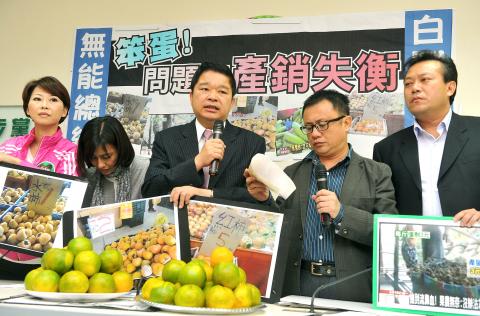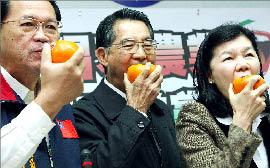The real problem with the nation’s agricultural sector is an imbalance between supply and demand and the government’s inability to resolve the matter, the Democratic Progressive Party (DPP) said yesterday amid a growing war of words between political parties over the price of persimmons.
“It’s the supply and demand imbalance, stupid,” DPP spokesperson Kang Yu-cheng (康裕成) said during a press conference, playing off a phrase made famous by former US president Bill Clinton during his 1992 presidential campaign.
Kang’s remark was made in response to criticism by President Ma Ying-jeou (馬英九) over the DPP’s claims about falling fruit prices for farmers under his watch.

Photo: Chien Jung-fong, Taipei Times
In a campaign flyer printed in the format of a calendar, the DPP listed a dozen types of locally grown fruits that have plunged in price this year.
Ma, Council of Agriculture (COA) Minister Chen Wu-hsiung (陳武雄) and the Chinese Nationalist Party (KMT) subsequently said the DPP was citing incorrect information to mislead the public ahead of next year’s presidential and legislative elections.
According to the DDP, prices for guavas in Changhua, longans in Greater Taichung and Nantou, persimmons in Taitung as well as tangerines in Yunlin have all fallen.

Photo: CNA
Ma rejected the DPP’s claim, saying that during his presidential campaign trips he had seen non-astringent persimmons sold for NT$41.5 per 600g, not NT$2 per 600g as the DPP says.
“The real issue here is that fruit growers sell their produce at a cost that is far lower than the cost of production, not how much those fruits sell for in the markets,” Kang said.
Ma made a “serious mistake” by citing wholesale and retail prices, rather than local prices, which is the price that actually relates to farmers’ income, Kang said.
While the persimmons shown on the flyer were non-astringent persimmons, the DPP was trying to highlight that astringent persimmons were being sold to local wholesalers at very low prices, DPP spokesperson Lin Chun-hsien (林俊憲) said.
However, Lin said Ma had missed the main point of the flyer, which was that the selling price for Taiwan-grown fruit has been far less than their average production cost.
The DPP caucus called on Ma to tackle the supply imbalance problem immediately and adopt a “95 percent mechanism” in which the government would purchase farm produce at 95 percent of the production cost whenever the selling price fell below specific prices monitored by the government.
Fruit imports from China between January and last month showed a 71 percent increase in comparison with the same period last year, DPP Legislator Pan Men-an (潘孟安) said, adding that the drop in prices could be because of the Economic Cooperation Framework Agreement (ECFA) signed between Taiwan and China in June last year.
An “early harvest” list accompanying the ECFA includes a number of agricultural products from Taiwan.
Citing statistics compiled by the Council of Agricultural Affairs, DPP Legislator Chiu Yi-ying (邱議瑩) said Taiwan exported 1,585 tonnes of bananas last year, but the figure showed a considerable drop this year, plunging to 859 tonnes between January and last month.
The DPP is not alone in drawing attention to the issue of falling produce prices, Chiu said, as numerous media outlets have been reporting on the phenomenon since June.
About one in five farmers does not qualify for government subsidies for natural disaster compensation because of unreasonable regulations, Lai Kun-cheng (賴坤成), a legislator from Taitung County, said, adding that he suspected that COA officials have kept the truth from Ma.
On Thursday, DPP Legislator Chen Min-wen (陳明文) disclosed a delivery order he had obtained from a local fruit grower in Fanlu Township (番路), Chiayi County, which showed that various grades of persimmons were sold for NT$2, NT$6 and NT$7 per kilogram, or NT$1.2, NT$2.4 and NT$4.2 per 600g (the equivalent of one Taiwanese jin, a traditional unit of weight).
Chen Min-wen urged Ma and Chen Wu-hsiung to inspect local prices in southern and eastern parts of the country, saying that most DPP legislators came from counties with a large agricultural output and tended to have a better understanding of local agricultural development.
“What the Ma administration should do is listen and then solve the problem, instead of blasting the DPP,” Chen Min-wen said.
KMT lawmakers and legislative candidates called a press conference demanding Tsai apologize to farmers.
Johnny Chiang (江啟臣), a legislative candidate in Greater Taichung, tore apart the DPP’s calendar, saying that farmers were so angry they planned to throw persimmon at the DPP headquarters in protest.
Chen Wu-hsiung said the claim that persimmons sold for NT$2 per 600g had caused farmers losses.
“It peeves me that the DPP didn’t bother to check the prices before it blamed others,” he said.
A persimmon farmer from Greater Taichung said that he was a victim of the DPP’s claim because his wholesalers decided to cancel all orders for fear of being overcharged.
“Non-astringent persimmons were never sold for less than NT$50 a jin, even while they were in season. After the DPP claimed that the price was NT$2 a jin, all my orders were canceled,” he said.
Hsu Kuei-kuang (徐貴光) said the picture of the persimmon, a Japanese variety named Maekawa Jiro, featured by the DPP was priced at more than NT$50 per 600g.
At a separate setting, Miaoli County Commissioner Liu Cheng-hung (劉政鴻) and some farmers called a press conference saying they would mobilize their peers to stage a protest in Taipei if Tsai failed to apologize within three days.
“If there is a place where sweet [non-astringent] persimmons sell for NT$2 a jin, I would like to buy 60 million grams at a price of NT$10 a jin,” Liu said.

A magnitude 7.0 earthquake struck off Yilan at 11:05pm yesterday, the Central Weather Administration (CWA) said. The epicenter was located at sea, about 32.3km east of Yilan County Hall, at a depth of 72.8km, CWA data showed There were no immediate reports of damage. The intensity of the quake, which gauges the actual effect of a seismic event, measured 4 in Yilan County area on Taiwan’s seven-tier intensity scale, the data showed. It measured 4 in other parts of eastern, northern and central Taiwan as well as Tainan, and 3 in Kaohsiung and Pingtung County, and 2 in Lienchiang and Penghu counties and 1

FOREIGN INTERFERENCE: Beijing would likely intensify public opinion warfare in next year’s local elections to prevent Lai from getting re-elected, the ‘Yomiuri Shimbun’ said Internal documents from a Chinese artificial intelligence (AI) company indicated that China has been using the technology to intervene in foreign elections, including propaganda targeting Taiwan’s local elections next year and presidential elections in 2028, a Japanese newspaper reported yesterday. The Institute of National Security of Vanderbilt University obtained nearly 400 pages of documents from GoLaxy, a company with ties to the Chinese government, and found evidence that it had apparently deployed sophisticated, AI-driven propaganda campaigns in Hong Kong and Taiwan to shape public opinion, the Yomiuri Shimbun reported. GoLaxy provides insights, situation analysis and public opinion-shaping technology by conducting network surveillance

Taiwan is gearing up to celebrate the New Year at events across the country, headlined by the annual countdown and Taipei 101 fireworks display at midnight. Many of the events are to be livesteamed online. See below for lineups and links: Taipei Taipei’s New Year’s Party 2026 is to begin at 7pm and run until 1am, with the theme “Sailing to the Future.” South Korean girl group KARA is headlining the concert at Taipei City Hall Plaza, with additional performances by Amber An (安心亞), Nick Chou (周湯豪), hip-hop trio Nine One One (玖壹壹), Bii (畢書盡), girl group Genblue (幻藍小熊) and more. The festivities are to

Auckland rang in 2026 with a downtown fireworks display launched from New Zealand’s tallest structure, Sky Tower, making it the first major city to greet the new year at a celebration dampened by rain, while crowds in Taipei braved the elements to watch Taipei 101’s display. South Pacific countries are the first to bid farewell to 2025. Clocks struck midnight in Auckland, with a population of 1.7 million, 18 hours before the famous ball was to drop in New York’s Times Square. The five-minute display involved 3,500 fireworks launched from the 240m Sky Tower. Smaller community events were canceled across New Zealand’s